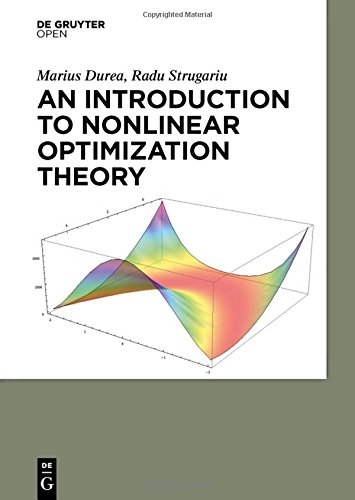
An Introduction to Nonlinear Optimization Theory
by Marius Durea, Radu Strugariu
Publisher: De Gruyter Open 2014
ISBN-13: 9783110426045
Number of pages: 328
Description:
The goal of this book is to present the main ideas and techniques in the field of continuous smooth and nonsmooth optimization. Starting with the case of differentiable data and the classical results on constrained optimization problems, and continuing with the topic of nonsmooth objects involved in optimization theory, the book concentrates on both theoretical and practical aspects of this field.
Download or read it online for free here:
Download link
(multiple PDF files)
Similar books
 Applied Mathematical Programming Using Algebraic Systems
Applied Mathematical Programming Using Algebraic Systemsby Bruce A. McCarl, Thomas H. Spreen - Texas A&M University
This book is intended to both serve as a reference guide and a text for a course on Applied Mathematical Programming. The text concentrates upon conceptual issues, problem formulation, computerized problem solution, and results interpretation.
(12641 views)
 Optimization and Dynamical Systems
Optimization and Dynamical Systemsby U. Helmke, J. B. Moore - Springer
Aimed at mathematics and engineering graduate students and researchers in the areas of optimization, dynamical systems, control systems, signal processing, and linear algebra. The problems solved are those of linear algebra and linear systems theory.
(14451 views)
 Iterative Methods for Optimization
Iterative Methods for Optimizationby C.T. Kelley - Society for Industrial Mathematics
This book presents a carefully selected group of methods for unconstrained and bound constrained optimization problems and analyzes them in depth both theoretically and algorithmically. It focuses on clarity in algorithmic description and analysis.
(11083 views)
 Linear Programming
Linear Programmingby Jim Burke - University of Washington
These are notes for an introductory course in linear programming. The four basic components of the course are modeling, solution methodology, duality theory, and sensitivity analysis. We focus on the simplex algorithm due to George Dantzig.
(8247 views)